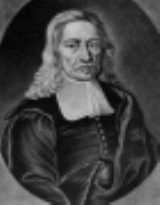
Jakob Thomasius
Encyclopedia
Jakob Thomasius was a German academic philosopher and jurist. He is now regarded as an important founding figure in the scholarly study of the history of philosophy
. His views were eclectic, and were taken up by his son Christian Thomasius
.
He wrote on a wide range of topics, including plagiarism
and the education of women.
He was the teacher of Gottfried Leibniz
at the University of Leipzig
, where Thomasius was professor of Rhetoric and Moral Philosophy, remaining a friend and correspondent, and has been described as Leibniz's mentor.
History of philosophy
The history of philosophy is the study of philosophical ideas and concepts through time. Issues specifically related to history of philosophy might include : How can changes in philosophy be accounted for historically? What drives the development of thought in its historical context? To what...
. His views were eclectic, and were taken up by his son Christian Thomasius
Christian Thomasius
Christian Thomasius was a German jurist and philosopher.- Biography :He was born at Leipzig and was educated by his father, Jakob Thomasius , at that time head master of Thomasschule zu Leipzig...
.
Academic
He was influential in the contemporary realignment of philosophy as a discipline. Martin Mulsow writes- According to Thomasius’ “Schediasma historicum” of 1665, from a theological point of view, philosophy needed to guarantee a clear separation of Creator from Creation, of God from Nature. It should thus only spring from ChristianChristianA Christian is a person who adheres to Christianity, an Abrahamic, monotheistic religion based on the life and teachings of Jesus of Nazareth as recorded in the Canonical gospels and the letters of the New Testament...
AristotelianismAristotelianismAristotelianism is a tradition of philosophy that takes its defining inspiration from the work of Aristotle. The works of Aristotle were initially defended by the members of the Peripatetic school, and, later on, by the Neoplatonists, who produced many commentaries on Aristotle's writings...
, not from StoicismStoicismStoicism is a school of Hellenistic philosophy founded in Athens by Zeno of Citium in the early . The Stoics taught that destructive emotions resulted from errors in judgment, and that a sage, or person of "moral and intellectual perfection," would not suffer such emotions.Stoics were concerned...
or NeoplatonismNeoplatonismNeoplatonism , is the modern term for a school of religious and mystical philosophy that took shape in the 3rd century AD, based on the teachings of Plato and earlier Platonists, with its earliest contributor believed to be Plotinus, and his teacher Ammonius Saccas...
.
He wrote on a wide range of topics, including plagiarism
Plagiarism
Plagiarism is defined in dictionaries as the "wrongful appropriation," "close imitation," or "purloining and publication" of another author's "language, thoughts, ideas, or expressions," and the representation of them as one's own original work, but the notion remains problematic with nebulous...
and the education of women.
He was the teacher of Gottfried Leibniz
Gottfried Leibniz
Gottfried Wilhelm Leibniz was a German philosopher and mathematician. He wrote in different languages, primarily in Latin , French and German ....
at the University of Leipzig
University of Leipzig
The University of Leipzig , located in Leipzig in the Free State of Saxony, Germany, is one of the oldest universities in the world and the second-oldest university in Germany...
, where Thomasius was professor of Rhetoric and Moral Philosophy, remaining a friend and correspondent, and has been described as Leibniz's mentor.
Works
- Philosophia practica (1661)
- Schediasma historicum (1665)
- De foeminarum eruditione (1671) with Johannes Sauerbrei and Jacobus Smalcius
- Praefationes sub auspicia disputationum suarum (1681)
- Dissertationes ad stoicae philosophiae (1682)
- Orationes (1683)

